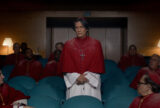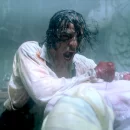04.15.2010 | By Jack Rico |


We all know the phrase “Keeping up with the Joneses,” and so does first time writer/director Darrick Borte, who has used that as the basis for his debut, called (appropriately enough) The Joneses. The subject matter is simple enough: Borte has elected to highlight modern society’s materialistic and status obsessions while at the same time postulating how out-of-control marketing campaigns have become. In a sense, consumers have become like children – see something, want something. Credit card debt is out of control because people can’t restrain their buying impulses. However, despite a brilliantly cynical premise and a delicious start, the film eventually wilts like a lily left out in the noonday heat. Like too many satires that start out with santoku-sharp edges, the blade dulls because the filmmakers don’t hone it as the third act approaches. A desire to be likeable and perhaps appealing to mainstream audiences causes The Joneses to fade before eventually imploding. The biggest gaffe: a late-inning sermon delivered by David Duchovny. The problem has less to do with his preaching ability than with the recognition that the message would be better left unsaid. Is Borte so uncertain of his skill that he has to spell out everything letter-by-letter? Whatever happened to subtlety?
At first glance, the Joneses appear to be a perfect family: father Steve (David Duchovny), mother Kate (Demi Moore), son Mick (Ben Hollingsworth), and daughter Jenn (Amber Heard). But since this is a movie, there’s no such thing as a “perfect family” and, despite the beautiful house, the expensive furniture, and the luxury cars, there are issues in this paradise, as becomes apparent when Jenn tries to slip into Dad’s bed one night. It turns out these four are actually employees of a corporation called LifeImage and have been seeded into this neighborhood to show off the good life to their neighbors and get them to buy the products LifeImage represents. The couple next door, Larry (Gary Cole) and Summer (Glenne Headly), fall for it hook, line, and sinker – but there’s an issue. Larry doesn’t make enough money to finance all the purchases and he soon finds himself drowning in debt – not exactly a unique situation in modern-day American society.
I’m a little uneasy about the film’s message regarding corporate amorality and greed. It’s not that I don’t think corporations sometimes cross lines in their marketing campaigns, but personal responsibility has to come into it, and that’s not something the film addresses. Blaming escalating personal debt on corporate practices is offering a scapegoat for a lack of fiscal restraint. According to The Joneses, when people get in over their heads in debt, it’s because of a company’s selling practices, not because of a lack of self-control on the part of consumers who should be watching their bottom line. These aren’t high school students caving in to peer pressure. Yes, the issue of “keeping up with the Joneses” is a problem in modern day America, but to put all the blame on the people marketing and selling the products is to overlook a major part of the issue.
That being said, the manner in which the film begins and the way it gradually reveals the truth about its protagonists is smart and savvy, and the satire of marketing is on-target more often than not. What’s being postulated by this film isn’t far from reality. Is it that much different to use product placement in movies and television shows than it is to use a real-life variation of the same thing? (In what I assume is an example of in-your-face irony, Borte uses a fair share of such placements in this movie, the most obvious of which is for a car I won’t name here.)
Solid performances from David Duchovny (in a cleaned-up version of his Californication character), Demi Moore (defying age), Ben Hollingsworth, and Amber Heard can’t save the movie when the screenplay goes as limp as a noodle and turns into a long string of clichés. It’s sad, really, because the movie begins with so much promise. It has its share of amusing moments but, in the end, The Joneses feels like a satire that never blossoms because of a fear of becoming too dark. It’s a missed opportunity that will have The Joneses struggling to keep up with its mid-April multiplex competition.
Rated: R for language, some sexual content, teen drinking and drug use.
Release Date: 2010-04-16
Screenplay: Derrick Borte, Randy T. Dinzler
Official Website: http://www.thejonesesmovie.com/




























